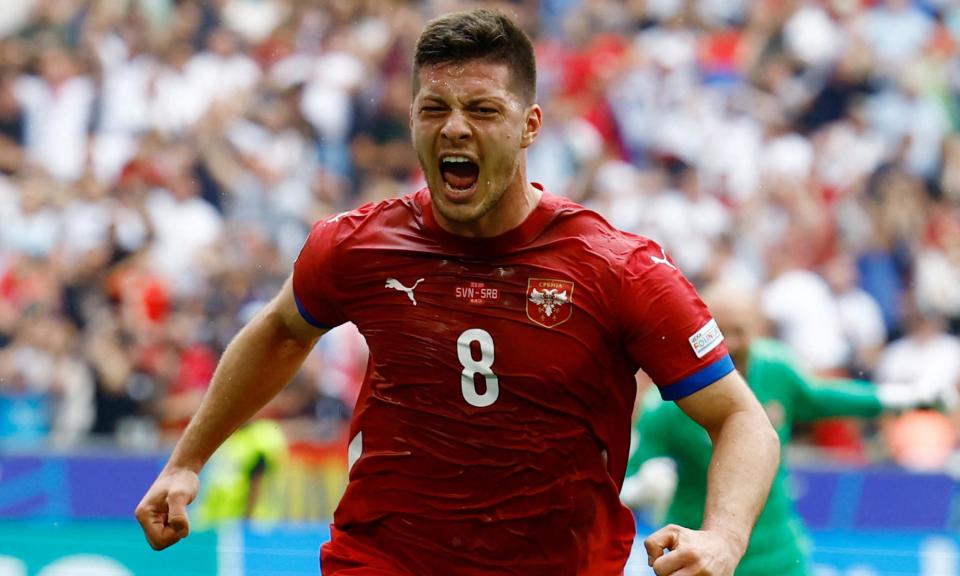Luka Jovic rescues Serbia with last-gasp header to deny Slovenia historic win

Serbia clearly fancy sticking around after all. The buildup to this tense, muggy, increasingly watchable encounter was dominated by their threat to pull out of Euro 2024 but nobody had told Luka Jovic to throw in the towel. They would have been gazing down the barrel of another major tournament letdown if the substitute had not intervened in the most dramatic way possible, sending Slovenia’s players crumpling to the floor by equalising with the final act of the game.
What glorious late chaos this was, and how unlikely it had felt during a closing spell that Slovenia were seeing out in relative comfort. As five minutes of added time dwindled, a number of Serbia’s supporters had decided their best bet for entertainment was to shower Jan Oblak, along with any of his teammates who ventured within range, with bottles. A smoke bomb had recently been set off for good measure when, with the referee Istvan Kovacs checking his watch one last time, Serbia loaded the box in search of salvation.
A Hail Mary from deep brought a ricochet behind and a corner that Ivan Ilic, whose goalkeeper Predrag Rajkovic sprinted upfield to provide an additional target, bent in devilishly. Perhaps Rajkovic’s presence at the near post distracted a previously resolute Slovenia back line, but the delivery was on point and Jovic, standing his ground amid a thicket of bodies, flashed an unstoppable header into Oblak’s far corner. There was barely time to restart, the theatre of doing so merely a brief interruption to wild scenes of celebration.
“Serbs do not die so easily,” said their manager Dragan Stojkovic, who had paced the touchline in frustration at a team whose ideas appeared to have run out. “We do not give up, and nor will we. We believe all the way to the end, and the reward came for believing.”
A win against Denmark will almost certainly bring a first knockout place in their country’s existing form. Slovenia may require three points of their own against England and must recover quickly from this gut punch. They had a foot in the round of 16 when Zan Karnicnik, their impressive right-back, seized on a loose touch from Mijat Gacinovic and embarked upon a 50-yard surge from his own half. He slid the ball left to Timi Max Elsnik and continued his run, appearing at the far post to slide in and cap what was effectively a long range one-two.
Karnicnik plays for Celje in Slovenia’s low-profile league and it was easy to reflect at the time that, unlike Serbia, his side are resoundingly greater than the sum of their parts. Matjaz Kek’s side have lost only once in their last 14 games and only a fool would underestimate them from here. They defended compactly and picked their moments to land a blow, giving as much as they got. Rather than strike a downbeat note around the denouement, Kek maintained that fortune will turn their way in Cologne against England.
“We’ve shown that we have a place here at the European championship,” he said. “Football can be cruel but I believe karma will do its part for this team. We played a fair game in an atmosphere for the ages.”
He was certainly correct about the volume from the stands. This match was the day’s undercard to most neutrals, but two small countries packed out one of Europe’s great venues and created yet another high-octane occasion that brimmed with importance and urgency.
Of course, as so often when Serbia are involved, there were caveats. It took only five and a half minutes for choruses claiming control of Kosovo to ring out, and this may not be the last anyone hears about the torrent of plastic missiles that followed later. The apparent chants from Albania and Croatia fans that caused Jovan Surbatovic, their general secretary, to raise the prospect of their withdrawal were utterly reprehensible, but Serbia must own the misdemeanours that occur in their name too.
Stojkovic flat-batted questions about Surbatovic’s comments, which will be rendered irrelevant if Uefa hands down charges to Albania and Croatia as expected. He was keener to focus on a game Serbia started slowly, struggling to locate pockets for the recalled Dusan Tadic and finding themselves exposed on the flanks. Elsnik, the tidy former Derby midfielder, hit a post eight minutes before the interval and Serbia were fortunate that Benjamin Sesko’s bearings were awry from the rebound.
That miss had the effect of lifting proceedings. From there it was a lively affair, Aleksandar Mitrovic twice thwarted by Oblak and hitting the bar soon after Karnicnik’s goal. Sesko, who departed with cramp, also forced Rajkovic to save at full stretch and both contenders ultimately entertained en route to fighting another day.
“Our style is very offensive,” Stojkovic said. “I don’t like boring football.” For all their manifest flaws, Serbia rarely produce any.

 Yahoo Sports
Yahoo Sports 